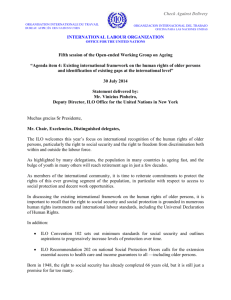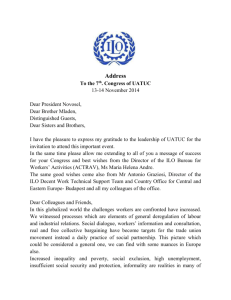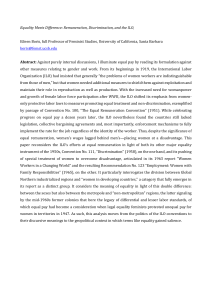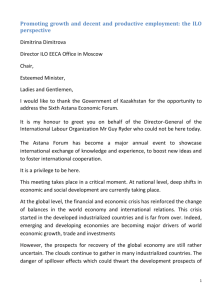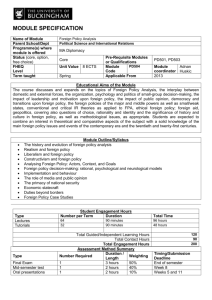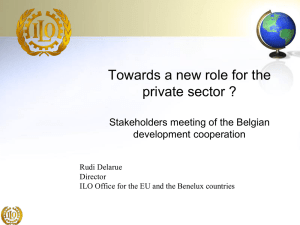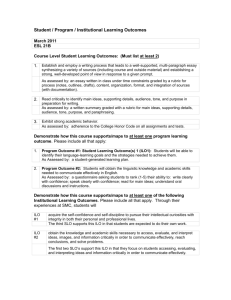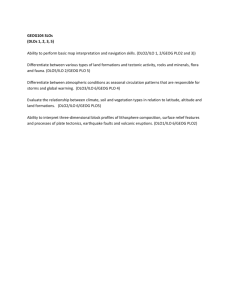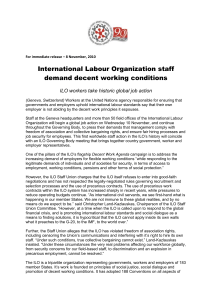ilo_sum.doc
advertisement
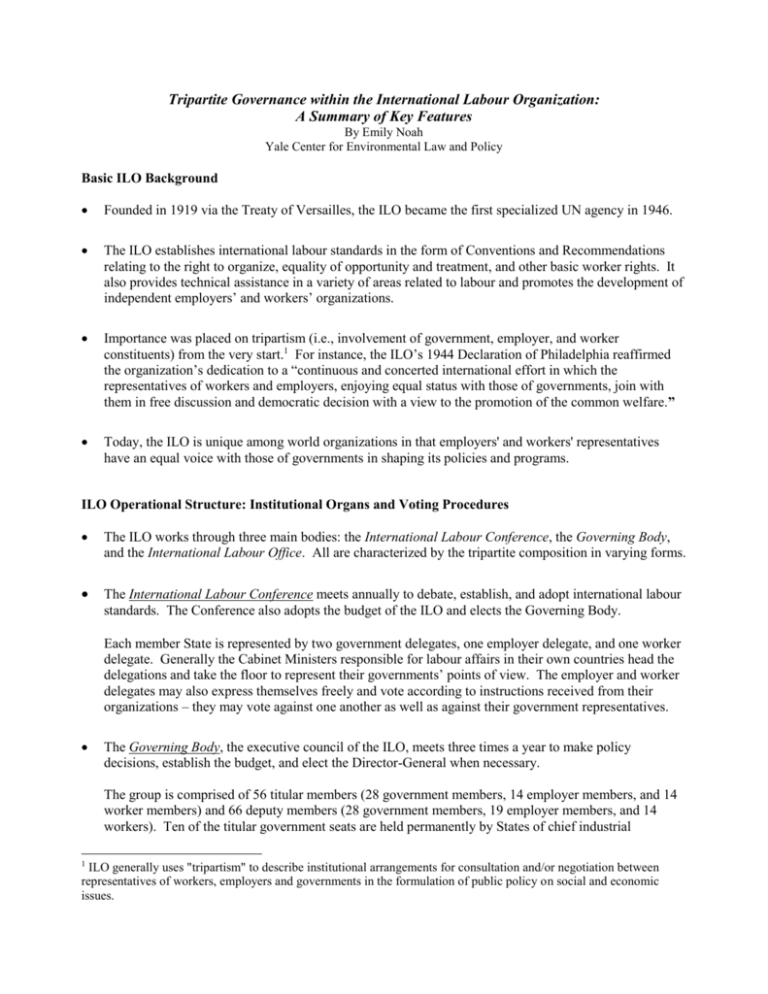
Tripartite Governance within the International Labour Organization: A Summary of Key Features By Emily Noah Yale Center for Environmental Law and Policy Basic ILO Background Founded in 1919 via the Treaty of Versailles, the ILO became the first specialized UN agency in 1946. The ILO establishes international labour standards in the form of Conventions and Recommendations relating to the right to organize, equality of opportunity and treatment, and other basic worker rights. It also provides technical assistance in a variety of areas related to labour and promotes the development of independent employers’ and workers’ organizations. Importance was placed on tripartism (i.e., involvement of government, employer, and worker constituents) from the very start.1 For instance, the ILO’s 1944 Declaration of Philadelphia reaffirmed the organization’s dedication to a “continuous and concerted international effort in which the representatives of workers and employers, enjoying equal status with those of governments, join with them in free discussion and democratic decision with a view to the promotion of the common welfare.” Today, the ILO is unique among world organizations in that employers' and workers' representatives have an equal voice with those of governments in shaping its policies and programs. ILO Operational Structure: Institutional Organs and Voting Procedures The ILO works through three main bodies: the International Labour Conference, the Governing Body, and the International Labour Office. All are characterized by the tripartite composition in varying forms. The International Labour Conference meets annually to debate, establish, and adopt international labour standards. The Conference also adopts the budget of the ILO and elects the Governing Body. Each member State is represented by two government delegates, one employer delegate, and one worker delegate. Generally the Cabinet Ministers responsible for labour affairs in their own countries head the delegations and take the floor to represent their governments’ points of view. The employer and worker delegates may also express themselves freely and vote according to instructions received from their organizations – they may vote against one another as well as against their government representatives. The Governing Body, the executive council of the ILO, meets three times a year to make policy decisions, establish the budget, and elect the Director-General when necessary. The group is comprised of 56 titular members (28 government members, 14 employer members, and 14 worker members) and 66 deputy members (28 government members, 19 employer members, and 14 workers). Ten of the titular government seats are held permanently by States of chief industrial 1 ILO generally uses "tripartism" to describe institutional arrangements for consultation and/or negotiation between representatives of workers, employers and governments in the formulation of public policy on social and economic issues. importance (i.e., Brazil, China, France, Germany, India, Italy, Japan, the Russian Federation, the United Kingdom and the United States), while representatives of other member nations are elected at the Conference every three years, taking geographical distribution into account. The employer and worker constituents elect their own representatives. The International Labour Office is the permanent secretariat of the ILO and conducts overall research, technical cooperation, and other activities for the organization under the leadership of a DirectorGeneral, who is elected for five-year, renewable terms. Included under its auspices are divisions dedicated to working with each constituent group: the Bureau for Employers' Activities, the Bureau for Workers' Activities, and the Department for Government and Labour Law and Administration (GLLAD), all contained within what is known as the ILO Social Dialogue Sector. Voting Procedures and Rights: Chapter 2, Article 17 of the ILO Constitution requires that all matters, except where otherwise provided for within the Constitution or by the terms of any Convention (e.g., in situations of arrears in payment of member contributions), be decided by simple majority and when a quorum is present. Further, Chapter 1, Article 4 holds that if one of the member States fails to nominate either of the required non-government delegates, the other non-government delegate in attendance shall be allowed speak but not to vote. ILO Efforts and Activities Focusing on Tripartism and Social Dialogue To strengthen tripartism and social dialogue is one of organization’s priority strategic objectives; the ILO recognizes effective tripartism and social dialogue as a prerequisite for accomplishing the organization’s other goals of sound labour relations, social justice for workers, etc. In addition to nurturing it through its operational structure and procedures, the ILO undertakes separate core activities to encourage tripartism and social dialogue at a larger scale. Within its Social Dialogue Sector, the ILO maintains its divisions dedicated to involvement of the three constituent groups and also operates an initiative known as the InFocus Programme on Strengthening Social Dialogue. The InFocus Programme on Strengthening Social Dialogue (IFP/Dialogue) was established to promote the practice of social dialogue in ILO member States as a means of sharing information among labour administrations, trade unions, and employers' associations and of developing consensus on policy approaches and practical measures to ensure equitable social and economic development. As part of this promotion work, the IFP/Dialogue seeks to strengthen institutions, machinery, and processes of social dialogue in member States and to strengthen the representation, capacity, and services of the parties to social dialogue. The Bureau for Employers’ Activities is charged with building the relationship between the ILO and employers’ organizations worldwide. The Bureau makes the resources of the ILO available to the employer organizations and through contact with these groups, is able to keep the ILO abreast of their concerns and priorities. 2 The mandate for the Bureau for Workers' Activities is as follows: 1) to strengthen representative, independent and democratic trade unions in all countries; 2) to enable them to play their role effectively in protecting workers' rights and interests at national and international levels; and 3) to promote the ratification and implementation of ILO Conventions. In parallel with the Bureau for Employers' Activities and the Bureau for Workers' Activities, the Department for Government and Labour Law and Administration (GLLAD) provides services to build the capacity of labour ministries and other relevant government agencies to participate in as well as help facilitate social dialogues. GLLAD provides assistance in the area of labour law and administration, but it is also intended to cut across all of the support needs of labour ministries and related units of government to influence economic and social policy. Perhaps most significant of all, the ILO consistently ties its goals on social dialogue into the substance of the Conventions, Recommendations, and other policy products and programs it generates. For example, several international labour standards and resolutions of the Conference address tripartism and multistakeholder participation in connection to the mandate for ILO technical cooperation activities. In addition, new initiatives under consideration are expected to be reviewed in light of the ILO Active Partnership Policy, which is aimed at bringing the organization closer to its constituent partners and facilitating their greater involvement in ILO activities at the member State level. Concluding Points of Analysis The ILO is justifiably held up as the current model among existing international organizations for stakeholder involvement in governance processes. It earns this reputation not just through promotional resolutions and programs but through concrete structural and procedural conditions (i.e., the organizational composition requirements and voting arrangements). Just as importantly, because the ILO recognizes research and clearinghouse functions as important roles for itself, the organization has retained integrity by documenting cases (e.g., in particular member states or with regard to certain issues) where tripartism and social dialogue have not produced success. Ironically, however, some critics have cited as one of ILO’s greatest shortcomings a longstanding resistance to coalition building with constituents outside of its tripartite focus (e.g., with a broader range of NGOs, such as consumer groups, religious institutions, media organizations, etc.). There is some indication that the ILO is improving in this respect as the International Program on the Elimination of Child Labor, which is based within the group, does involve a diversity of organizations representing more viewpoints than those found in the traditional tripartite construct. Observers emphasize improved coalition building with outside groups as essential for the ILO if the organization is going to play an important role within the debates on globalization. These commentators think it may be unrealistic for any single institution to represent the concerns of all workers within today’s economies. Still others emphasize the weakness of the ILO as an organization (e.g., it cannot impose trade sanctions on member States) as a shortcoming in its efforts to protect the rights of all stakeholders equally – i.e., including those of workers. These critics point to the fact that as the situation is for all other multilateral agreements, governments adopt ILO Conventions on a voluntary basis, and as of now, not all governments have adopted all Conventions or enforced them adequately. 3 As a result of a perception of the ILO being weak and/or ineffectual, labor advocates and policy makers have increasingly attempted to incorporate labor provisions into NAFTA and the WTO. In 1997, the WTO finally addressed the link between trade and labor conditions but then officially handed over responsibility for the issues to the ILO. Sources Haufler, Virginia, “Comparing Private Sector Initiatives: Labor Standards, Information Privacy and Environmental Management,” in Role of the Private Sector: Study Group (Carnegie Endowment for International Peace), November 1998. ILO, “GLLAD - Its Role and Functions,” available at http://www.ilo.org/public/english/dialogue/govlab/about.htm. ILO, “ILO and Employers,” available at http://www.ilo.org/public/english/dialogue/actemp/about/ilo_emp.htm. ILO, ILO Constitution, available at http://www.ilo.org/public/english/about/index.htm. ILO, ILO Declaration of Philadelphia, available at http://www.ilo.org/public/english/about/index.htm. ILO, “ILO Mandate,” available at http://www.ilo.org/public/english/about/mandate.htm. ILO, “Overview: ILO InFocus Programme on Strengthening Social Dialogue,” available at http://www.ilo.org/public/english/dialogue/infocus/about.htm. ILO, “Structure of the ILO,” available at http://www.ilo.org/public/english/depts/fact.htm. ILO, “The Strategic Objectives of the ILO,” available at http://webfusion.ilo.org/public/db/bureau/program/objectives . ILO, “Tripartism and Social Dialogue,” available at http://www.ilo.org/public/english/dialogue/actrav/genact/socdial/tripart/index.htm. Newland, Kathleen, “Workers of the World, Now What?,” Foreign Policy, Spring 1999. Sutherland, Peter, et al, “Challenges Facing the WTO and Policies to Address Global Governance,” in The Role of the World Trade Organization in Global Governance, (Ed., Gary Sampson), 2001. 4
